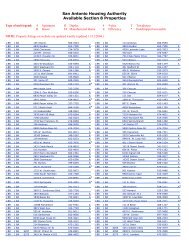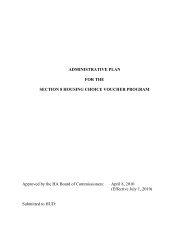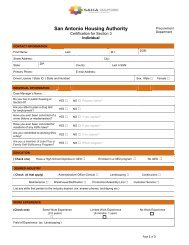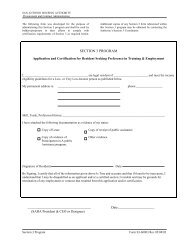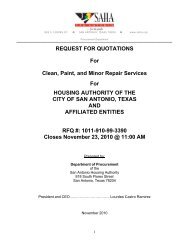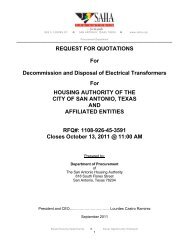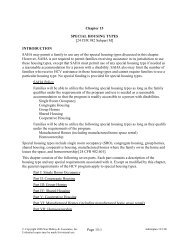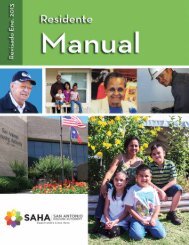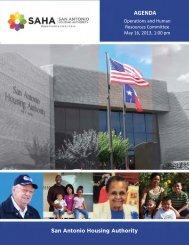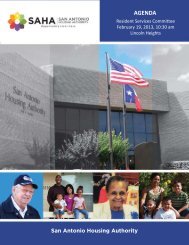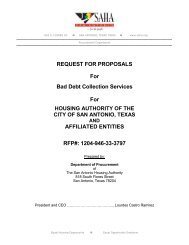REQUEST FOR QUOTATIONS For Unit Make Ready Services For ...
REQUEST FOR QUOTATIONS For Unit Make Ready Services For ...
REQUEST FOR QUOTATIONS For Unit Make Ready Services For ...
You also want an ePaper? Increase the reach of your titles
YUMPU automatically turns print PDFs into web optimized ePapers that Google loves.
<strong>For</strong>m W-9 (Rev. 10-2007) Page 43. Real estate transactions. You must sign the certification.You may cross out item 2 of the certification.4. Other payments. You must give your correct TIN, but youdo not have to sign the certification unless you have beennotified that you have previously given an incorrect TIN. “Otherpayments” include payments made in the course of therequester’s trade or business for rents, royalties, goods (otherthan bills for merchandise), medical and health care services(including payments to corporations), payments to anonemployee for services, payments to certain fishing boat crewmembers and fishermen, and gross proceeds paid to attorneys(including payments to corporations).5. Mortgage interest paid by you, acquisition orabandonment of secured property, cancellation of debt,qualified tuition program payments (under section 529), IRA,Coverdell ESA, Archer MSA or HSA contributions ordistributions, and pension distributions. You must give yourcorrect TIN, but you do not have to sign the certification.What Name and Number To Give the Requester<strong>For</strong> this type of account:1. Individual2. Two or more individuals (jointaccount)3. Custodian account of a minor(Uniform Gift to Minors Act)4. a. The usual revocable savingstrust (grantor is also trustee)b. So-called trust account that isnot a legal or valid trust understate law5. Sole proprietorship or disregardedentity owned by an individual<strong>For</strong> this type of account:6. Disregarded entity not owned by anindividual7. A valid trust, estate, or pension trust8. Corporate or LLC electingcorporate status on <strong>For</strong>m 88329. Association, club, religious,charitable, educational, or othertax-exempt organization10. Partnership or multi-member LLC11. A broker or registered nominee12. Account with the Department ofAgriculture in the name of a publicentity (such as a state or localgovernment, school district, orprison) that receives agriculturalprogram paymentsGive name and SSN of:The individualThe actual owner of the account or,if combined funds, the first1individual on the accountThe minor 2The grantor-trustee 1The actual owner 1The owner 3The ownerGive name and EIN of:Legal entity 4The corporationThe organizationThe partnershipThe broker or nomineeThe public entity1List first and circle the name of the person whose number you furnish. If only one personon a joint account has an SSN, that person’s number must be furnished.2Circle the minor’s name and furnish the minor’s SSN.3You must show your individual name and you may also enter your business or “DBA”name on the second name line. You may use either your SSN or EIN (if you have one),but the IRS encourages you to use your SSN.4List first and circle the name of the trust, estate, or pension trust. (Do not furnish the TINof the personal representative or trustee unless the legal entity itself is not designated inthe account title.) Also see Special rules for partnerships on page 1.Note. If no name is circled when more than one name is listed,the number will be considered to be that of the first name listed.Secure Your Tax Records from Identity TheftIdentity theft occurs when someone uses your personalinformation such as your name, social security number (SSN), orother identifying information, without your permission, to commitfraud or other crimes. An identity thief may use your SSN to geta job or may file a tax return using your SSN to receive a refund.To reduce your risk:● Protect your SSN,● Ensure your employer is protecting your SSN, and● Be careful when choosing a tax preparer.Call the IRS at 1-800-829-1040 if you think your identity hasbeen used inappropriately for tax purposes.Victims of identity theft who are experiencing economic harmor a system problem, or are seeking help in resolving taxproblems that have not been resolved through normal channels,may be eligible for Taxpayer Advocate Service (TAS) assistance.You can reach TAS by calling the TAS toll-free case intake lineat 1-877-777-4778 or TTY/TDD 1-800-829-4059.Protect yourself from suspicious emails or phishingschemes. Phishing is the creation and use of email andwebsites designed to mimic legitimate business emails andwebsites. The most common act is sending an email to a userfalsely claiming to be an established legitimate enterprise in anattempt to scam the user into surrendering private informationthat will be used for identity theft.The IRS does not initiate contacts with taxpayers via emails.Also, the IRS does not request personal detailed informationthrough email or ask taxpayers for the PIN numbers, passwords,or similar secret access information for their credit card, bank, orother financial accounts.If you receive an unsolicited email claiming to be from the IRS,forward this message to phishing@irs.gov. You may also reportmisuse of the IRS name, logo, or other IRS personal property tothe Treasury Inspector General for Tax Administration at1-800-366-4484. You can forward suspicious emails to theFederal Trade Commission at: spam@uce.gov or contact them atwww.consumer.gov/idtheft or 1-877-IDTHEFT(438-4338).Visit the IRS website at www.irs.gov to learn more aboutidentity theft and how to reduce your risk.Privacy Act NoticeSection 6109 of the Internal Revenue Code requires you to provide your correct TIN to persons who must file information returns with the IRS to report interest,dividends, and certain other income paid to you, mortgage interest you paid, the acquisition or abandonment of secured property, cancellation of debt, orcontributions you made to an IRA, or Archer MSA or HSA. The IRS uses the numbers for identification purposes and to help verify the accuracy of your tax return.The IRS may also provide this information to the Department of Justice for civil and criminal litigation, and to cities, states, the District of Columbia, and U.S.possessions to carry out their tax laws. We may also disclose this information to other countries under a tax treaty, to federal and state agencies to enforce federalnontax criminal laws, or to federal law enforcement and intelligence agencies to combat terrorism.You must provide your TIN whether or not you are required to file a tax return. Payers must generally withhold 28% of taxable interest, dividend, and certain otherpayments to a payee who does not give a TIN to a payer. Certain penalties may also apply.




